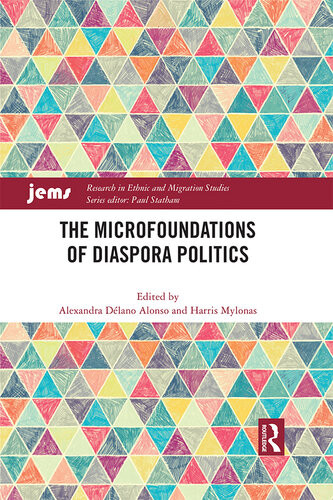

Most ebook files are in PDF format, so you can easily read them using various software such as Foxit Reader or directly on the Google Chrome browser.
Some ebook files are released by publishers in other formats such as .awz, .mobi, .epub, .fb2, etc. You may need to install specific software to read these formats on mobile/PC, such as Calibre.
Please read the tutorial at this link: https://ebookbell.com/faq
We offer FREE conversion to the popular formats you request; however, this may take some time. Therefore, right after payment, please email us, and we will try to provide the service as quickly as possible.
For some exceptional file formats or broken links (if any), please refrain from opening any disputes. Instead, email us first, and we will try to assist within a maximum of 6 hours.
EbookBell Team

4.1
100 reviewsThe Microfoundations of Diaspora Politics examines the various actors within and beyond the state that participate in the design and implementation of diaspora policies, as well as the mechanisms through which diasporas are constructed by governments, political parties, diaspora entrepreneurs, or international organisations.
Reviews:
"For a long time, state-centred analyses focused on relationships between analytically homogenized states and 'their' diasporas. The contributors to this volume show that diasporic populations have many-sided and complex connections to homelands, often at a micro-level, but they are rarely subordinate or passive players. This book demonstrates that to understand diasporas, we need fully to excavate the social and political spaces above and below the national." -- Robin Cohen, Professor Emeritus of Development Studies, University of Oxford
"After a period in which both case studies of state-diaspora relations and cross-national comparative typological analyses dominated the study of diaspora engagement policies, this book reveals that our field of study is ready to handle more complexity. The Microfoundations of Diaspora Politics gives us a fine-grained view of how an array of individuals, elites, political parties, organizations at different levels, regions, and lastly, also the international system, interact in the making and unmaking of diaspora policies and politics. Together, the chapters in this volume make a formidable contribution towards a multi-level, multi-actor, multi-spatial and longitudinal analysis of diaspora politics. They take us a step forward in confronting the challenge of studying not only diaspora policy design, but implementation. More fundamentally, through the treatment of some untypical and complex cases across the world they challenge our very definition of "diaspora engagement policies" as implying homogeneous, uplifting forms of linkage. - Luicy Pedroza